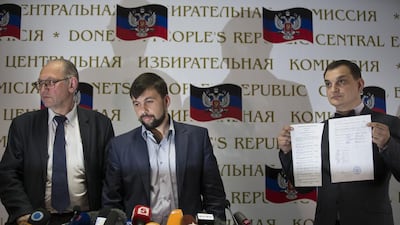DONETSK // Pro-Russia insurgents in Ukraine’s Donetsk region declared independence yesterday and asked to join Russia – a day after holding a hastily arranged vote on separatism.
The Kremlin had no immediate response to the annexation request, but issued a statement earlier in the day that urged Ukraine’s government in Kiev to talk with the pro-Russia insurgents in the east.
Organisers said about 90 per cent of those who cast ballots on Sunday in Donetsk and the neighbouring Luhansk region backed sovereignty for the sprawling areas that lie along Russia’s border and form Ukraine’s industrial heartland. Donetsk has about 4.4 million people and Luhansk has 2.2 million.
Insurgents in Luhansk stopped short of mimicking the move made by Donetsk, but spokesman Vasily Nikitin said the Luhansk region would not vote in Ukraine’s May 25 presidential election.
Kiev and the West completely rejected the insurgent vote and accused Moscow of fomenting weeks of unrest in eastern Ukraine in a possible attempt to grab more land after annexing Crimea in March – accusations Russia has denied.
“The farce, which terrorists call the referendum, will have no legal consequences except the criminal responsibility for its organisers,” Ukraine’s acting president Oleksandr Turchynov said.
The interim government in Kiev was hoping the presidential vote would unify the country behind a new, democratically chosen leadership. Ukraine’s crisis could grow even worse if regions start rejecting the presidential vote.
In Moscow, Russian president Vladimir Putin’s office voiced hope that the Organisation for Security and Cooperation in Europe (OSCE) could help to broker talks between the central government and the two provinces.
The cautious stance – which contrasted with Russia’s quick annexation of Crimea after a separatist vote there – appeared to show Russia favouring a negotiated solution.
“The practical implementation of the referendum results should proceed in a civilised way without any throwbacks to violence through a dialogue between representatives of Kiev, Donetsk and Luhansk,” the Kremlin said.
Pro-Russia insurgents who organised Sunday’s vote claimed 89 per cent of those who cast ballots in Donetsk and about 96 per cent of those who turned out in Luhansk voted for sovereignty. The insurgents said turnout topped 70 per cent, but with no international election monitors it was impossible to confirm such claims.
Swiss president Didier Burkhalter, whose country currently chairs the OSCE, met Mr Putin last week to propose a road map for settling the Ukrainian crisis and outlined some of that plan yesterday in Brussels.
“We have seen in Moscow that there is openness for a dialogue,” Mr Burkhalter said.
The OSCE plan urges all sides to refrain from violence and calls for an immediate adoption of an amnesty law. It also envisages a comprehensive national dialogue focusing on decentralisation and the status of the Russian language.
Maintaining its pressure on Moscow, the European Union’s foreign ministers added 13 people and two firms yesterday to their visa ban and asset freeze list over Ukraine.
The US and the EU, which have slapped travel bans and asset freezes on members of Mr Putin’s entourage after Russia’s annexation of Crimea, have warned they could target entire sectors of the Russian economy if Moscow tries to derail Ukraine’s presidential vote.
Dozens have been reported killed since Ukrainian forces began trying to retake some eastern cities.
* Associated Press

